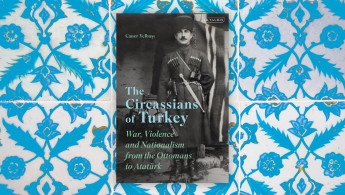The Circassians of Turkey: War, Violence and Nationalism from the Ottomans to Ataturk
The formation of the Turkish republic and the leadership of Mustafa Kemal Ataturk are at the centre of identity in the Mediterranean country today.
The late Ottoman world was diverse and made up of groups from across the world, however, the role these groups played during the early Republican period can be a thorny one.
A huge part of the politics of the post-Ottoman world was the attempt to submerge all groups under the identity of Turkish, which included the adoption of linguistic, cultural, social and political norms, which the state regarded as ‘authentically’ Turkish.
"Circassians are one of Turkey’s largest ethnic groups and they originated from the Caucasus, in what is today southern Russia"
Turkification was a critical part of the nation state-building effort and any attempt to stop it was seen as a national security threat.
The Circassians have been dubbed ‘traitors to the nation’ in some Turkish nationalist writing for their apparent resistance to Ataturk, but as Caner Yelbasi’s The Circassians of Turkey: War, Violence and Nationalism from the Ottomans to Ataturk shows the Circassian community exhibited a wide range of responses to the war of independence.
Circassians are one of Turkey’s largest ethnic groups and they originated from the Caucasus, in what is today southern Russia. In the 19th century, Moscow’s expansion into the Caucasus region led to the death, destruction and displacement of the mostly-Muslim group and the majority ended up in present-day Turkey.
Up to three million Circassians call Turkey their home today.
Yelbasi's book mostly focuses on the period post-1918 as the First World War ends and Turkey finds itself occupied by Western powers.
While many Circassians enjoyed greater freedoms in the 1870s in the Ottoman Empire and even underwent a ‘golden age’ in the first part of the 20th century, the transformation of the country and the rise of nationalism split the community.
Traditionally loyal to the Ottoman sultan, the end of The Great War saw Turkey divided between two different governments, the Sultan in Istanbul and a new government based in Ankara which “the loyalty of the Circassians was, contrary to the traditional accounts, split between the two governments.
"The ordinary Circassian people, generally speaking, supported the loyalists [To the Sultan], while the majority of the military elite and CUP members backed the nationalists.”
|
Yelbasi touches on a number of sensitive areas from a Turkish historiographical perspective. For example the 1919-1923 War of Independence from the allied occupation, often characterised as a revolt by Turkish historians, Yelbasi recasts as a civil war, which he argues allows it to be studied in comparison to others during this period including in Russia and elsewhere.
It also has the implied understanding of fractured and factionalised responses from different groups considered part of the nation, which undermines the unitarian narrative implied by the idea of a national revolt against foreign occupation.
This can be a very dangerous move as questioning any aspect of the official narrative landed you in legal trouble in the past. To think of Circassians as not having a uniformed response, but rather reacting to events as they unfolded could have implications for the study of other groups during this period.
"Following the War of Independence and the rise of the Turkish republic, Circassians found themselves with far fewer rights than their counterparts elsewhere, such as in Jordan"
Some Circassians sought the support of the Greeks to set up a breakaway homeland free from both the nationalists and Istanbul. Those who sought to break away were made up of different political and socio-factions who were united in their suspicion of Kemalism.
Ibrahim Hakki, who was the governor of Izmir, pushed for the creation of a buffer state free of both Ottoman and Kemalist control after Istanbul lost control of the region in 1921.
His misgivings stemmed from having to deal with the precursor to the Kemalists, the Community for the Union of Progress (CUP) before the First World War, which saw him being exiled to Egypt. “He opposed the actions of the Ankara government and did not allow its military units or supporters to live in this region.
"He pursued a policy that was not overly aggressive when trying to convince people to accept his anti-Kuva-yi Milliye move. He acted, in fact, rather peacefully.” Ultimately he was unsuccessful and while some Circassians fought against Ataturks, others fought with him.
Following the War of Independence and the rise of the Turkish republic, Circassians found themselves with far fewer rights than their counterparts elsewhere, such as in Jordan.
Assimilationist policies meant Circassians were under threats of losing their identity, “Unlike the Kurdish identity, which is not only a cultural identity but a political one also, the Circassian identity in Turkey today is far from being a political identity.”
Trying to organise to protect Circassian culture as well as facing ambivalence from the state has been difficult for them. Yelbasi’s study is an important contribution in bring out the nuances of Circassian history in Turkey during the formative period of the republic, it not only questions the official narrative, but also tries to present the complexity of Circassian history and the ongoing challenges the question of Circassian identity faces today.
Usman Butt is a multimedia television researcher, filmmaker and writer based in London. Usman read International Relations and Arabic Language at the University of Westminster and completed a Master of Arts in Palestine Studies at the University of Exeter.
Follow him on Twitter: @TheUsmanButt

![Circassians in Istanbul, Turkey, 19th Century [Getty Images]](/sites/default/files/2022-04/GettyImages-464754505.jpg)


